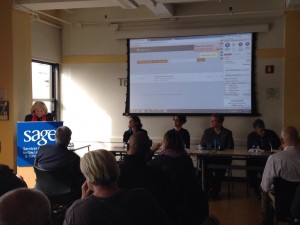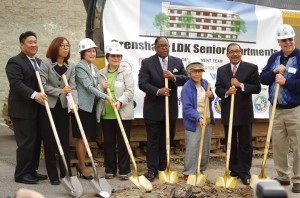Housing is a critical need for elders across the board. On one hand, economic insecurity is an issue facing many LGBT elders and elders in communities of color. The Diverse Elders Coalition’s document, “Securing Our Future” [PDF] discusses what this issue looks like for diverse elder communities and includes policy recommendations. For these communities, senior housing often provides a low-cost alternative that can mean the difference between having a home or being on the street.
At the same time, senior housing settings provide the ability to create spaces and living arrangements that can better meet the cultural needs of specific communities. For groups that are linguistically isolated because of limited English proficiency, or for LGBT elders who would otherwise have to go back in the closet in other kinds of housing options, housing communities can be set up to meet their specific, and often very urgent, needs.
Two new housing initiatives that launched this past week are now able to provide unique community and living spaces that are specifically tailored to the needs of constituencies served by the Diverse Elders Coalition. In Los Angeles’ Koreatown, the new LDK Senior Apartments opened its doors to a vibrant community of low-income Korean American elders, with programs that provide access to healthcare, in-language services, and cultural and community social activities. The ribbon cutting ceremony brought a number of local elected officials to witness the opening, including Mark Ridley Thomas, Herb Wesson, Tom LaBonge, and John Choi. Three non-profit partners directly grounded in the Asian American and Pacific Islander community served as key partners in creating the LDK Senior Apartments. At the local level, the Korean Resource Center served as a critical liaison to the Korean American community and the Little Tokyo Service Center brought its years of expertise in housing and community development to bear. At the national level, the National Korean American Service and Education Consortium provided support in earlier stages of the project and is an organization that works with DEC national partners Southeast Asia Resource Action Center and the National Asian Pacific Center on Aging.

Across the country in New York City, DEC partner Services & Advocacy for GLBT Elders launched a new National LGBT Elder Housing Initiative with a nationally-broadcast press conference that brought local luminaries to New York. Kicking off the event was Edie Windsor, longtime advocate for LGBT elders who rose to national prominence as the plaintiff in the 2013 Supreme Court Case that ruled key sections of the Defense of Marriage Act unconstitutional, helping provide marriage equality and equal access to a range of federal programs for married same-sex couples. A panel discussion laid out the five priorities of the new national initiative, which include:
- Building LGBT elder housing and sharing SAGE’s expertise from such projects;
- Training existing housing facilities to provide housing in an LGBT-welcoming, non-discriminatory manner;
- Changing public policies to clear the way for more LGBT elder housing and bar housing discrimination against LGBT older people;
- Educating LGBT older people in how to look for LGBT-friendly housing and how to exercise their rights; and
- Expanding LGBT-friendly services available in housing sites across the country.
A National Steering Committee provides oversight to the Initiative, and a National Advisory Board, which includes groups such as the National Center and Caucus for Black Aging and DEC partner National Hispanic Council on Aging, provides additional support and expertise.
New programs like these represent cutting edge solutions that address ongoing challenges faced by elders whose particular needs haven’t been historically addressed.


